UROPers' EXPERIENCES
UROP || iUROP
UROP Experiences
Kampong House 63C at Pulau Ubin
A group of 20 students from ASD worked on a project to research Kampong House 63C at Pulau Ubin, under the guidance of Dr Lai Chee Kien and Assistant Prof Michael Budig (ASD).
The project aims to document the site around House 63C and the jetty village, based on architectural, historical and social aspects. The team showcased their work at Pesta Ubin on 24 June 2018, organised by NParks, Friends of Ubin Network (FUN) and joined by other related organisations and voluntary groups.
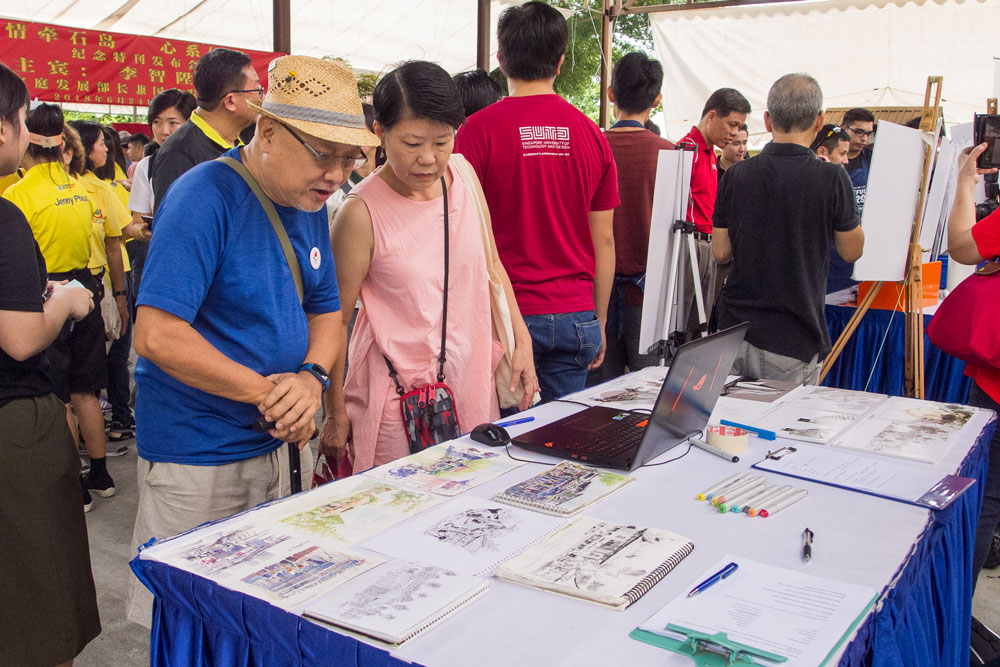 Public appreciating the works of UROP’s sketcher team.
Public appreciating the works of UROP’s sketcher team.
The team showcased their work on a 3D scan of the site, photographs of various scales, sketches of observations made around the area and shared conversations held with the locals. Studio projects focusing on a re-interpretation of timber techniques and vernacular architecture, by 14 of the ASD Term 7 and 9 students, were also showcased. Pesta Ubin was attended by Minister for Trade and Industry, Mr Chan Chun Sing and Minister for Social and Family Development, Second Minister for National Development, Mr Desmond Lee, who both contributed to the project by penning down their impressions of Pulau Ubin.
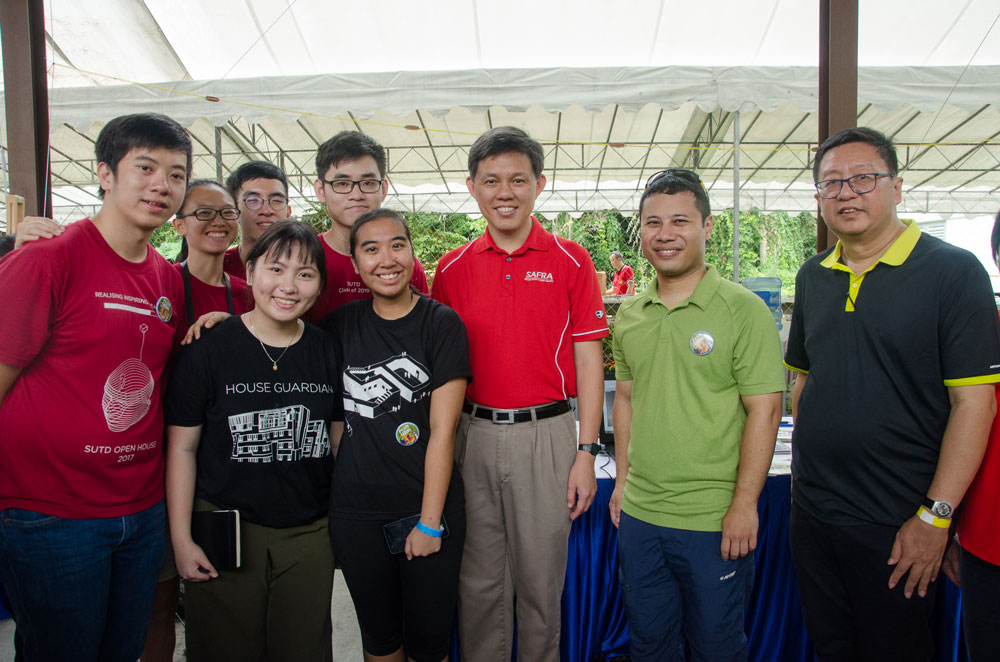 Pesta Ubin was attended by Minister for Trade and Industry, Mr Chan Chun Sing and Minister for Social and Family Development, Second Minister for National Development, Mr Desmond Lee.
Pesta Ubin was attended by Minister for Trade and Industry, Mr Chan Chun Sing and Minister for Social and Family Development, Second Minister for National Development, Mr Desmond Lee.
"I so love it!" - UROPer Zhang Zhexian
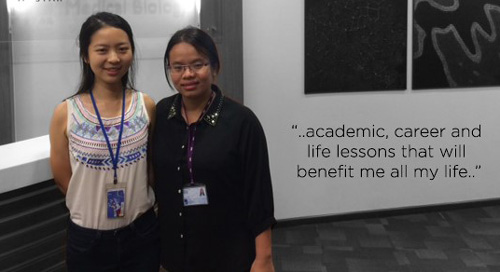 Zhexian (left) with her UROP supervisor Dr Dang Thuy Tram (right).
Zhexian (left) with her UROP supervisor Dr Dang Thuy Tram (right).
How do you think you have benefitted from participating in a UROP project?
New or Niche
I had a hard time choosing my UROP project - from over hundreds of topic listings, every single one of them sounded exciting. Should I explore a new field or develop what I have experience in?
The professor I chose to be my mentor said to me, “Although it is interesting to do something totally new, it would be more fulfilling to discover and develop your niche, the subject that you have a strong foundation in. This will result in a shorter adaptive (input) period but a longer creative (output) period, which lead to more time for deep research and higher chance for breakthrough findings.”
Errors or Arrows
The golden rule is “Ask when in Doubt; Never Assume”. Even though we should prevent making careless mistakes, there are many other so-called “mistakes” that are invaluable in science research – negative results that reduce the candidate pool, and unexpected positive outcome that becomes a new discovery itself. So keep making “mistakes” and keep trying!
What advice would you give to your peers or juniors who want to take up UROP?
“I so love it” (Passion)
Love keeps us going when everything stops moving.
“Freedom oh freedom” (Independence)
There is flexibility for you to decide short term goals and deadlines but the freedom should not be taken for granted. Instead, work independently and proactively while frequently checking with supervisor for guidance.
“None of us is as smart as all of us” (Teamwork)
In UROP, it is likely that you will only be doing a part of the entire project. My advice is to know as many people involved in the project as early as possible. Not only will you benefit from seeing the big picture, you will also likely receive crucial help from other researchers who are working on the area you have trouble with. Among all, most importantly, you should develop a strong friendship with your mentor. A mentor-student relationship lets you share your ambitions, challenges, and gives you new perspectives long after the research period is over. Personally I would like to express my deep gratitude towards my mentor Dr Dang Thuy Tram, who taught me not only technical skills, but academic, career and life lessons that will benefit me all my life. Thank you!
"It seems like the perfect investment!" - UROP supervisor, Assoc Prof Robert Simpson
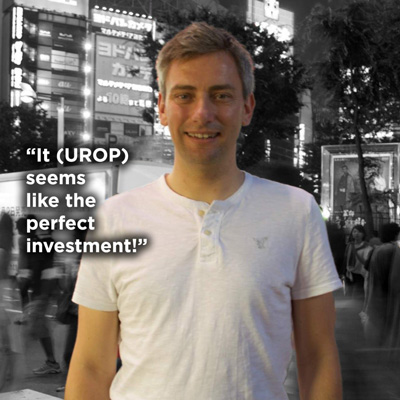 UROP supervisor, Assoc Prof Robert Simpson (EPD)
UROP supervisor, Assoc Prof Robert Simpson (EPD)
In your opinion, what are the benefits of students participating in a UROP project?
I remember from my undergraduate days, where we were encouraged to gain experience in research labs, that there was a statistically significant increase in grades after students spent time working in a research lab. Practical experience provides an opportunity to directly apply the knowledge gained from the undergraduate courses to real scientific problems, and I think this can be motivational.
Last semester, we had a UROP project to design, build, and program a new piece of scientific apparatus to measure the activation energy of phase transformations in composition spread films. The project required knowledge from a broad range of SUTD's first year courses- especially “The Digital World”, the "Advanced Math”, and "Engineering in the Physical World". In fact Yu Han (UROP student), who was working on the project, deliberately decided to use Python as the language to perform the data analyses because he could supplement the skills he was simultaneously learning in “The Digital World” course.
Practical experience provides an opportunity to directly apply the knowledge gained from the undergraduate courses to real scientific problems
Associate Prof Robert Simpson, EPD
UROP also provides a risk free environment for students to try out their practical problem solving skills and gain work experience. If the project goes well, then the student gains new experiences, gets to play with some expensive cool toys (errr.., I mean scientific equipment), has fun, and hopefully publishes a real scientific paper. The advisor gets to work with an enthusiastic student who will help the research group get results to prove an idea that could be used in a journal paper, or could be the basis of a future grant proposal.
In addition, UROP students in the ACTAlab work closely with PhD students and postdocs, and this provides a further learning experience as well as insight into academic life. All in all, both the UROP student and the advisor have nothing to lose, yet they can both gain a lot. It seems like the perfect investment!
iUROP Experiences
MIT iUROP
In 2018, Joel Tan (Freshmore) had the opportunity to travel to MIT to work on an iUROP project “3D printing of Photonic Structural Colors” with MIT researchers. This project was a collaboration between Prof Joel Yang (SUTD EPD) and Prof John Hart (MIT Mechanical Engineering).
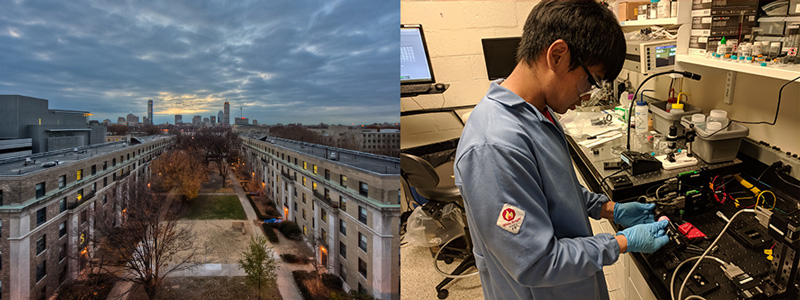 Picture (left): MIT courtyard. Picture (right): Joel Tan (EPD), observing the drying of polystyrene nanoparticle solution in one of MIT’s humidity-controlled labs.
Picture (left): MIT courtyard. Picture (right): Joel Tan (EPD), observing the drying of polystyrene nanoparticle solution in one of MIT’s humidity-controlled labs.
Hear what Joel says
My experience was extremely fruitful. The US culture can be extremely different from ours and the people there seem less inhibited and more expressive. Initially, this might seem intimidating, but as time went on I was endeared to it. I lived in a fraternity and a hostel at MIT and was truly able to be one with the undergraduates there.
Skydiving was great! I also went for the American Chemical Society meet and it was a great conference.
My advice: Do not take the pre-departure formalities lightly, preparation is key. Dare to try and believe in yourselves!
Chiba iUROP
Through a faculty-collaborated project between Prof Huang Shaoying (SUTD EPD) and Prof Yu Wenwei (Chiba University), three iUROPers - Lionell Loh (Freshmore), Chen Yidan (Junior, EPD) and Kee Lek Ee (Junior, EPD), embarked on a 1-month research attachment during the Independent Activities Period (IAP) in 2018.
They worked under close mentorship with Prof Yu and fellow researchers in Chiba University. Besides working on their research projects, the iUROPers also got to immerse into Japan’s rich culture diversity and indulge in mouth-watering Japanese cuisines everyday.
 Picture (Left, clockwise from left): Prof Yu Wenwei (project mentor), Lionell, Yidan and Lek Ee. Picture right: Farewell dinner with the Chiba University research team
Picture (Left, clockwise from left): Prof Yu Wenwei (project mentor), Lionell, Yidan and Lek Ee. Picture right: Farewell dinner with the Chiba University research team

Hear what Lionell says
iUROP in Chiba was a period of self-exploration. There were no bounds, I was on my own, learning any and everything I needed and wanted to from the Japanese. It was great fun.